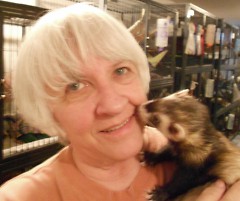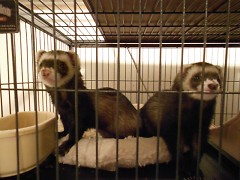When Dee Gage added two ferrets to her family in 1996, she didn’t expect to become the founder of The West Michigan Ferret Connection (WMFC) shelter.
“If you had told me I would be doing this 11 years ago, I would have said you were crazy,” she says. Her shelter opened its doors in October of 2001. Since then, Gage has rehomed over 500 ferrets, and currently has 41 ferrets available for adoption.
“I started doing this out of a two bedroom apartment,” Gage says, “I had a little Mazda Miata. I bought this house for the ferrets, and gave up my Miata for a minivan.”
The shelter resides in the basement level of Gage’s home in Grand Rapids where she and two volunteers from the Midwest Ferret Fellowship care for the animals. The MWFC shelter is one of the few shelters in Michigan that specialize with ferret care.
“As far as I know, there are only really two legitimate ferret shelters in the entire state,” Gage says, “That’s me and Motor City Ferrets in Detroit.” Gage says there is a need for specialized shelters like hers because normal shelters are not equipped for ferrets, which require a specialized diet and two to four hours of human interaction outside of a cage each day.
"When they get one, the Humane Society calls me," she says, "Pretty much now, they just refer people to me."
Despite the need, running the shelter is costly.
“I can spend at least $2000 a month on food alone,” she says, “It’s all out of pocket. I may get a donation here and there. And there’s my adoption fees.” Gage charges $90 per adoption, and ensures that bonded ferrets stay together.
Gage explains that splitting bonded ferrets can be dangerous to the animals, and often if one of the bonded pair dies the other may follow.
"Nine times out of 10, they’ll get depressed and die," says Gage, "I’ve had a number of them go that way.”
Gage also pre-screens applicants to ensure the animals are going to a good home.
“The criteria I’m really looking for is if they’ve had ferrets before. Number two, I want to know if they own or rent,” Gage says. “If they rent, I need a written letter from the landlord. A lot of places say they allow small animals, but as soon as they find out it’s a ferret, they change their mind. These little guys have already been dumped once; I want to make sure they don’t get dumped again.”
Ferrets became legal to own in Michigan in 1994, and are very susceptible to abandonment and mistreatment. Gage says this is due a lack of understanding by the public.
"You have to think kittens and puppies when you think ferrets," she says. The majority of ferrets that come to her shelter are from pet stores, abandoned or unwanted by their owners. Gage has no difficulty telling which ferrets in her shelter originated from pet stores. Marshall Farms is the largest breeder and supplier of ferrets in the United States, and tattoos each ferret with two dots in the ear before shipping. The dots verify the ferret has been neutered and de-scented. Only one of the ferrets in her shelter is missing the tattoo.
“We live in a disposable society,” Gage says. “People walk into a store like Petco and see those little baby ferrets bouncing around, housed like the guinea pigs and the rabbits. They figure ferrets are a cage animal. But they aren’t, they are very social, very interactive. And of course, once the novelty wears off, then I get a phone call.”
The Rapidian, a program of the 501(c)3 nonprofit Community Media Center, relies on the community’s support to help cover the cost of training reporters and publishing content.
We need your help.
If each of our readers and content creators who values this community platform help support its creation and maintenance, The Rapidian can continue to educate and facilitate a conversation around issues for years to come.
Please support The Rapidian and make a contribution today.


